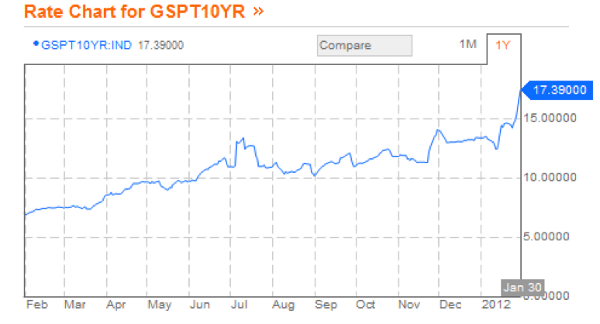Today the EU leaders are gathering again for another summit! More than two years into their crisis, they cannot get their act together while continuing on the same path of an absurd austerity that has only produced higher debts, lower government revenues, lower growth, higher unemployment, and no prospects. It seems that the EU leaders have discovered new math where the total increases through consecutive unsuccessful subtractions.
At some point this madness needs to stop, by cutting the losses, taking significant haircuts (all of them including the official institutional purchasers such as the ECB), establishing an interest-rate moratorium for the time being, breaking up the banks that were the perpetrators of the crisis, providing incentives for production and employment, and identifying new competent leadership.
Portugal’s ten-year yield has just hit a record high of 17.39%, as the graph below shows. If Greece experiences a hard default, then financial contagion may be unleashed that won’t stop in Portugal.
If it were not for the new lower standards for collateral and the long-term loans that the ECB has started providing since December, the Euro would have collapsed by now. Merkonti (Merkel, Sarkozy, and Monti) may declare that they see elements of financial stability, but there is no such thing with an unsustainable huge private and public debt hangover, especially when recession has been knocking at EU’s door. Debt sales may succeed this week, but this is due to the ECB’s liquidity facilities. Banks borrow from the ECB, hoard some of the cash, while exercise carry trade with the balance of their borrowings by purchasing higher-yield paper. At some point that liquidity may be stopped due to idiosyncratic risks at ECB’s balance sheet. The deal they are preparing for Greece is unsustainable because no debt of 120% of GDP achievable eight years from now (!) is manageable, especially when they ask the Greeks to give up their national sovereignty and accept a budget commissioner/overseer.
EU’s fiscal compact along with a permanent mechanism (ESM) that will replace the EFSF may prove to be unworkable, because both are making the wrong assumptions regarding the wrong-targeted problems at the most awkward time.
The Euro edged up higher recently while the dollar lost some ground. Don’t be surprised if you see this trend reversing in the next few days.

